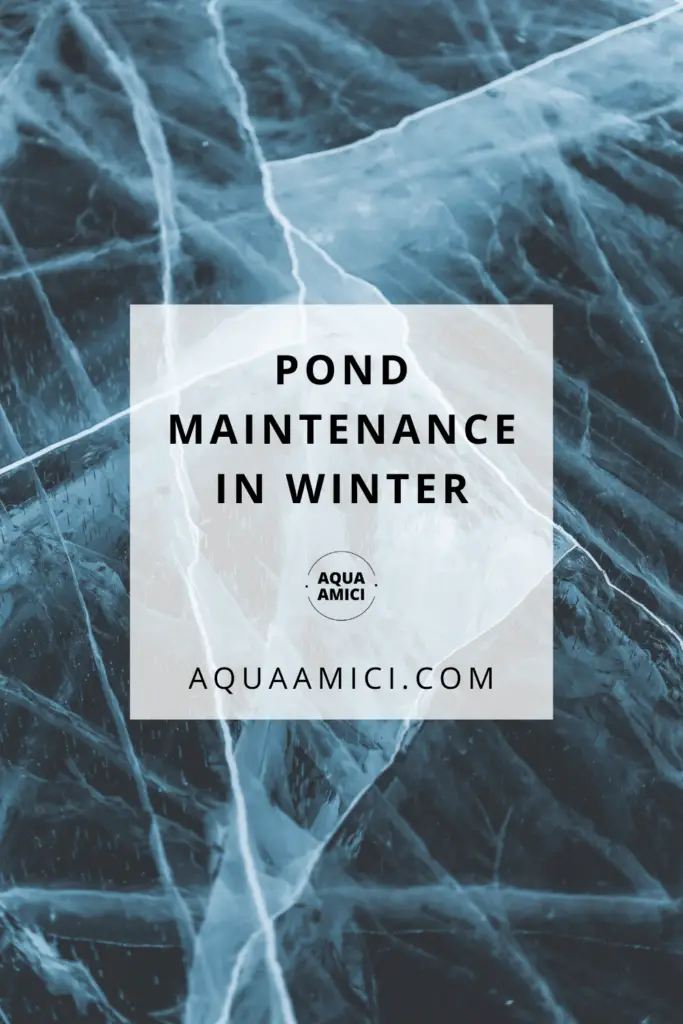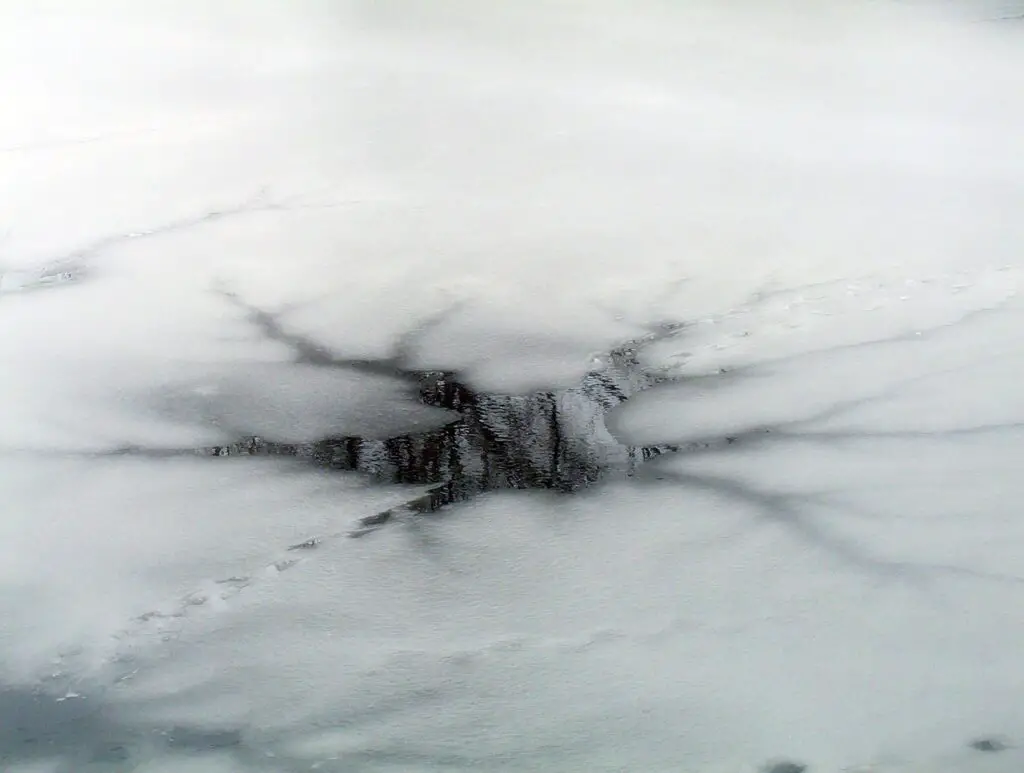To ensure the survival of your pond and its inhabitants, it is crucial to implement effective winter pond care practices. In this article, we will provide a comprehensive guide on essential pond care tips for the winter season.
Winter is a challenging time for pond owners, as the harsh weather conditions can have a significant impact on the health and well-being of their aquatic ecosystem.
Neglecting proper winter preparations can lead to a range of issues, including poor water quality, stressed or even sick and dying fish, and damage to plants and equipment.
Your Pond in Winter
As winter arrives, your pond undergoes changes that can impact its delicate balance. Low temperatures, ice formation, and reduced sunlight all pose challenges for the health of your pond ecosystem.
Firstly, low temperatures cause water to cool down, affecting the overall metabolism and activity levels of fish, plants, and microorganisms. This includes also the nitrifying bacteria slow down or even aren’t able to function properly anymore if the temp drops below 10 degrees Celcius (40 degrees Fahrenheit).
Reduced sunlight, due to shorter days and lower angles of sunlight, limits the photosynthetic process in aquatic plants. This, in turn, affects oxygen production and nutrient cycling in the pond ecosystem
The formation of ice on the pond surface brings its own set of challenges. As the ice thickens, it restricts the exchange of gases between the water and the atmosphere, leading to oxygen depletion. Harmful gases like ammonia and carbon dioxide can accumulate, posing a threat to the health of your aquatic life.
These conditions can be detrimental to the well-being of your fish and plants. Oxygen depletion may cause stress or even suffocation for fish, while harmful gas buildup can lead to toxic water conditions.
Additionally, reduced sunlight affects plant growth, impacting their ability to produce oxygen and contribute to the overall balance of the pond.
Ensuring Proper Oxygenation and making a Hole in Ice
When it comes to winter pond maintenance, one of the critical aspects to consider is proper oxygenation. As temperatures drop, ice formation becomes a concern, posing a threat to the survival of fish.
By using a pond aerator, you can introduce oxygen into the water and create circulation, even during freezing temperatures. This helps prevent oxygen depletion and allows fish to survive in winter. Additionally, aeration systems help in breaking up ice formations, ensuring that gas exchange can take place, so you may not even need to use a heater or a de-icer.
De-icers and heaters can definitely be helpful in winter. These devices help maintain openings in the ice, allowing for gas exchange and preventing the pond from completely freezing over. Furthermore, they ensure a stable temperature gradient, providing a refuge for fish during the colder months. A smaller heater even if isn’t able to heat up the whole pond, it may create a small area of warmer water, where fish can choose to swim in and out.
Maintaining Fish Health in Winter
During the winter months, it’s essential to pay special attention to the well-being of your pond fish. Cold temperatures and the changing environment can pose challenges, but with proper care, you can ensure their survival and health throughout the winter season.
Feeding Adjustments
As the water temperature drops, fish metabolism slows down, and their appetite decreases. Adjust feeding frequency accordingly and switch to a cold-water fish food formula that is specifically designed for their nutritional needs during colder months. It’s easily digestible, making sure your fish can get most of the nutrients it contains. This helps prevent overfeeding, reduces waste buildup, and promotes optimal digestion.
Fish Health Monitoring
Regularly observe your fish for any signs of disease, apathy or abnormal behavior. Changes in swimming patterns, loss of appetite, or visible lesions may indicate underlying health issues. Early detection allows for prompt intervention and treatment, if necessary.
Emergency Preparedness
Prepare for unforeseen circumstances such as power outages or equipment failures. Have a backup power source or a plan to maintain a stable environment for your fish during such situations. It’s important to keep the water oxygenated and the temperature stable to ensure their well-being.
Monitoring and Pond Maintenance During Winter
Proper monitoring and maintenance are vital aspects of winter pond care to ensure the well-being of your aquatic ecosystem. Even though the pond may appear dormant, it still requires attention to prevent potential issues and maintain water quality.
Ice Inspection
Regularly check the thickness of the ice covering your pond. As mentioned before, it’s crucial to maintain an open hole in the ice to allow gas exchange and prevent the buildup of harmful gases. This is especially important for the survival of your fish.
Water Quality Testing
Test the water parameters regularly, focusing on pH, ammonia, nitrite and nitrate levels. Cold temperatures can affect water chemistry, and monitoring these parameters helps identify any imbalances or issues that need to be addressed. Below you can find some great tests I use myself:
These links are Amazon affiliate links. This means that if you decide to purchase something using these links, I may earn a small commision.
Preparing the Pond for Winter
Here is just a short summary of the most important things to do in your pond before winter. If you want to know more, have a look at this article.
First and foremost, removing debris is essential. Fallen leaves, dead plants, and other organic matter can lead to nutrient imbalances and decay in the water.
Next, it’s time to trim and prune your aquatic plants. By cutting back excessive growth, you prevent an accumulation of organic matter that can degrade water quality. Also removing dead parts of the plants belongs to the “removing debris” step.
Consider investing in a pond heater or floating de-icer as well. These devices prevent the entire pond from freezing over, ensuring gas exchange and providing a safe haven for your fish. If you don’t need any of these because winters in your region aren’t too harsh, consider using just aeration.
Remember, it’s important to prepare your pond early enough for winter. Furthermore, regular monitoring and adjusting maintenance practices according to changing weather conditions are also essential.
Don’t wait until winter is upon you! Your pond and your aquatic pets will thank you for it.



